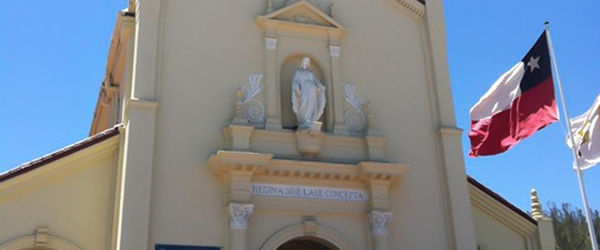“It has been a very intense and wonderful learning experience for everyone,” says Deacon Ed Mills, regional diaconate formation director. “We had outstanding teaching by the seminary faculty who worked with the candidates, all from various walks of life. The candidates were formed very much the same way priests are formed; there was continuity with the faculty and each year built on the one before.”
“The process has truly enriched my life,” agrees Pat Coulter, a deacon candidate from Holy Cross Church in Moorpark. “It was all that I thought it would be and more.”
The end — and the beginning — is especially sweet for Coulter, who heard the call and began his journey to the diaconate nearly 40 years ago. But careers in business and as a Marine Corps officer delayed the completion of his formation for ordained ministry. When he applied to re-enter the process, there was an obstacle.
“I encountered some difficulty about my age, but I was determined and committed to follow through with this life-long call to service,” he explains, adding that Santa Barbara Region Auxiliary Bishop Thomas Curry gave him an exemption, allowing him to begin the process in the region. About a year and a half into the program he retired from his corporate career and is now taking classes at St. John’s Seminary in Camarillo, “to give me more time to delve into theology and spirituality,” he says.
David Munoz, deacon candidate from Our Lady of Sorrows Church in Santa Barbara, is also no stranger to the diaconate formation process. He began in the first Santa Barbara Region deacon class nearly a decade ago, but after a year and a half realized that the time wasn’t right due to the needs of his family, and he put the call to the diaconate on hold.
“So I moved into it slowly,” Munoz says. “This was my second time, and this time my wife Angie attended all the classes with me.”
Both Coulter and Munoz say they are being called into bereavement ministry. Coulter had some experience with bereavement during his career as a Marine officer, and is often called upon now by military organizations to assist with committals, although he says he is open to God’s will if he is called in another direction.
Munoz, however, was “a bit surprised” by his attraction to bereavement ministry. He and Angie have served their parish in religious education, as lectors and in Eucharistic ministry, but his experiences in the formation process have led him in this new direction.
“Some of the speakers really touched me,” Munoz says of his formation experiences that have dealt with bereavement. “I have realized that it is important to care for the family as a whole, through illness and death.”
Mills emphasizes that the ministry of deacon is centered on the corporal works of mercy, so much of their formation concerns discovering and learning about all of the places and opportunities to serve that exist in their communities. For example, the candidates focused on homeless projects within their deaneries including hospitals and jails.
The current group of deacon candidates is nearly as large as the class of 60 ordained in June 2007 at Santa Barbara City College. That does not mean, however, that any of them will lack for service opportunities.
“The new deacons will have plenty to do,” says Mills, one of six deacons serving at Our Lady of the Assumption Church in Ventura. “You’d be surprised at the huge amounts of work in parishes, and in society in general, that there is to be done.”
To equip the candidates for service as deacons, lots of time is taken during the formation process for prayer, reflection and development of spirituality. Mills explains that many forms of prayer — some liturgical and some scriptural in addition to personal — are used to enrich the candidates’ spiritual lives, including lectio divina, liturgy of the hours and the Ignatian exercises.
For Coulter, Munoz and the other 46 deacon candidates, ordination will take place on July 16 at the Cathedral of Our Lady of the Angels, with Archbishop José Gomez presiding. (Another 14 men from the archdiocese will be ordained deacons by Archbishop Gomez in June.)
Between now and ordination day, there are just a few more class sessions, a retreat and a couple of get-togethers remaining in the formation process.
“I am joyful, but scared to death,” Coulter says (with a smile) of the pending ordination, “because I know there is still so much to learn.”
“Regardless of what lies ahead, God is going to take care of it all,” Munoz says. “I have learned to trust. How it unfolds it unfolds, and I am ready.”
{gallery width=100 height=100}gallery/2011/0422-29/deacons/{/gallery}

